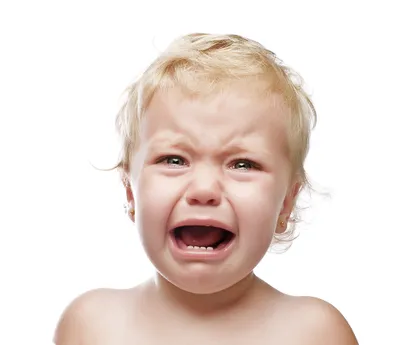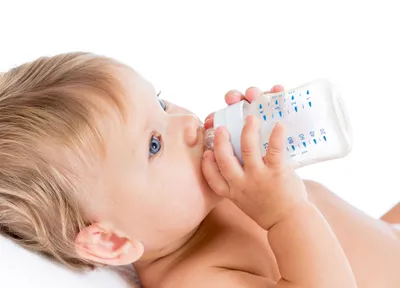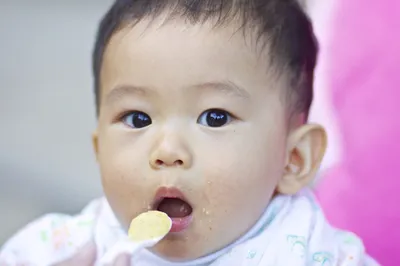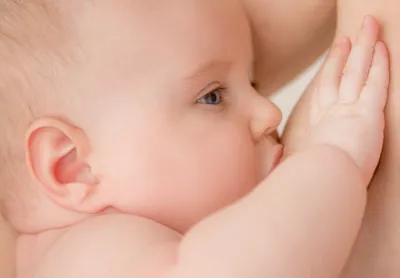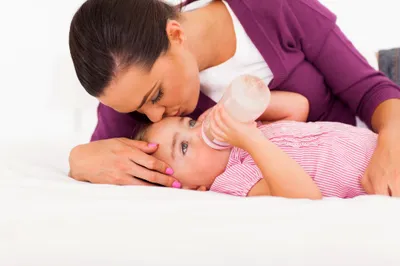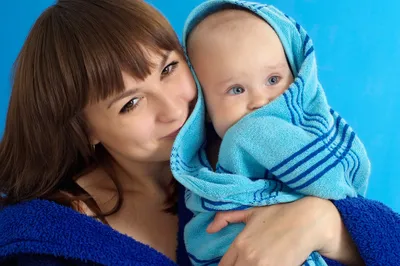When your baby is teething, it can be a painful experience for them and you! While teething is inevitable (and means they will be able to sample more than mush and milk), it doesn’t have to mean you both have to suffer through sleepless nights. Your baby will likely start teething around six months, if they haven’t already. That can lead to a sudden change in the mood of your child, so it’s best to be prepared to handle it.
Here are 6 “breakthrough” ways to ease the pain of teething…
1. Massage your Baby’s Gums
The Mayo Clinic said if your baby seems out of sorts from teething, then you might want to try massaging his or her gums—even if that seems counterintuitive. While you may think that touching their gums will cause more pain, the clinic says the opposite.
The clinic suggests using your (clean) finger or moistened gauze to gently rub the gums and ease your baby’s woes. The pressure can actually help to alleviate some of the pain, said the Mayo Clinic. This is also an effective way to feel around where the teeth are popping out.
2. Put Out the Fire in Their Mouth
Teething pain is akin to a burning sensation for many babies, so the ideal solution to this is to cool down their gums—think washcloths soaked in cold water, or a cold (not frozen) piece of fruit in a mesh feeder.
Some experts say you should stay away from frozen objects such as frozen teething rings, as the cold might be a bit too much for your infant’s sensitive gums. You can also let them gnaw on a baby bottle full of cold water instead of breastfeeding, as babies can tend to bite down when they’re in pain.
3. Be Careful of Dreaded Drool Rash
When baby is teething, he or she often drools a great deal onto their chin, which can cause it’s own discomfort. Excess drool can eventually cause a rash that is painful to the touch for your little one.
The trick is to try and wipe away the drool with a soft cloth (avoid abrasive materials such as paper towel). You can also try to apply some soothing creams to your baby’s facial skin to ease the burning sensation and help the skin heal.
4. Clamp Down on Breastfeeding
Not literally, of course. Quite the opposite. When baby feels the urge to bite down during breastfeeding, it can be a bit traumatic for you as the source. While your negative reaction is sometimes enough to remind you baby that biting your nipple is not pleasant, you can slip your finger between his or her mouth and your breast to prevent the bite (timing might take some practice on this one).
Today’s Parent magazine also suggests another tactic—when baby is biting, instead of pulling away, you can press baby’s face into your breast so it blocks the nose and causes them to surface for air after a few seconds. It may feel counterintuitive, but it usually works and doesn’t harm the baby (but don’t block their breathing for longer than necessary).
5. Avoid Numbing Gels
You may feel a biting urge to quickly alleviate your infant’s gum pain with medicated gels, but some experts advise against it. In fact, the U.S. Food and Drug Administration (FDA) says the previous techniques mentioned are better than over-the-counter medications.
In particular, the FDA warns against benzocaine products such as oral gels for children under 2-years old. Not only can it numb their throats and increase choking risk, the FDA notes that in rare cases it can cause a potentially fatal condition called methemoglobinemia that reduces oxygen to your baby’s bloodstream.
6. Painkillers as a Last Resort
The Mayo Clinic lists common over-the-counter painkillers such as acetaminophen and ibuprofen that are not topical (applied directly to a specific area on the body). As teething can cause a mild fever, these remedies that are taken orally in small doses can help relieve pain and swelling.
Be sure to follow the directions and dosage on the medication closely, and to buy only oral pain remedies that are intended specifically for the age of your baby (typically under 2-years is an infant formula). Try the other solutions first before administering the juice.

